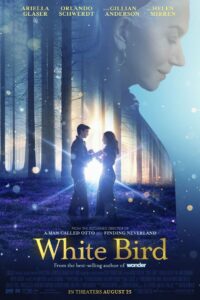
Wonder – White Bird
1942. Sara’s just 15 and living her life in Alsace, which is part of France not totally grabbed by the Germans yet. But things are changing fast, and their presence is getting stronger, causing lots of trouble. She finds herself saved by a family, especially a boy named Julien who’s got polio—someone she wasn’t all that friendly with at first.As time passes and she remains in hiding, the two grow into very close friends.
As for the movie, it puts so much effort into staying true to the book that it ends up missing some of the story’s deeper messages. Marc Forster seems to have banked on the success of the film *Wonder*, hoping for another hit. Unfortunately, trying to connect it so directly with Julia Roberts and Owen Wilson’s movie feels a bit forced.
Kicking things off with a nod to *Wonder’s* bully being expelled doesn’t do enough to smoothly link into Grandma Helen Mirren’s story about her past as a persecuted Jewish girl. The connection is pretty weak: both movies come from books written by R.J. Palacio—that’s about it.
The problem really lies in trying to take what worked in print and make it fit on screen—and Forster should know this from his previous work like *Christopher Robin* or *The Kite Runner*. Yet here we are! Well, at least his outsider view lets him bring a fresh perspective.
This movie dives into how some French folks sided with the Nazis during their occupation, and it doesn’t sugarcoat things at all. Even the kids aren’t spared; one of them turns out to be more dedicated to the Nazi cause than you’d expect.
The movie has a few parts that throw off its serious vibe. For example, there’s this scene where Julien imagines projecting images on the wall where Sara’s hiding, which feels a bit out there. And then there’s a moment with wolves that just takes things way beyond believable. And let’s not forget about the bird flying around, which seems symbolic but doesn’t really fit snugly into the story.
The heart of the tale could’ve been about understanding between those who once did the discriminating (like Sara picking on Julien for his condition) and then becoming targets of discrimination themselves. It had moments where it truly shined in this regard but didn’t quite hit the mark as much as it could have, especially for younger audiences. Bit of a missed opportunity, honestly!
To watch movies and TV shows online, please sign up with our partner, a legit streaming service.
Get Started ➔






